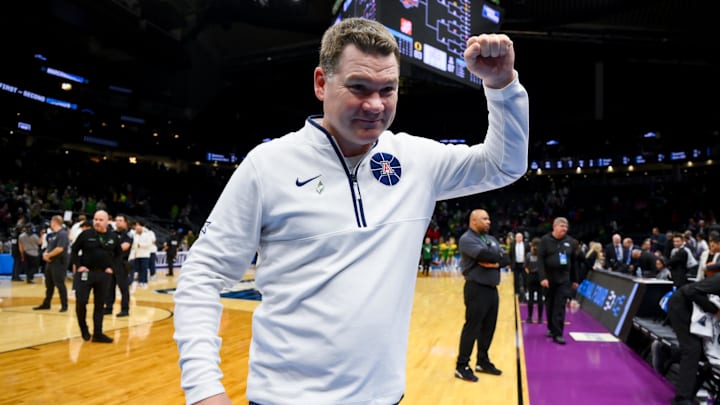Arizona is a two-seed in the latest updated ESPN bracketology posted by Joe Lunardi on Tuesday. Forward Tobe Awaka, point guard Jaden Bradley and wing Anthony Dell'Orso return as starters for Arizona in 2025-26. According to the 247Sports composite rankings, Arizona signed the second-best class of 2025.
Five-star prospects, guard Brayden Burries and forward Koa Peat, four-star forward Dwayne Aristode and three-star Bryce James should be one of the most impactful classes in 2025-26. Burries and Peat are consensus projected starters, Aristode is thought to be a key reserve, and James is more of a developmental player.
Center Motiejus Krivas returns after missing all but eight games with a foot injury that required season-ending surgery. Krivas is expected to start for Arizona in 2025-26. Harvard transfer guard Evan Nelson, a Salpointe Catholic alum, provides Arizona with experience in the backcourt.
Lunardi projects Arizona as the second seed in the West Regional that is in San Jose in 2026. Fifteenth-seeded Idaho is projected as the first-round opponent for Arizona. Idaho has not played in the NCAA Tournament since losing to Louisville in 1990.
NEW: Way-Too-Early College Basketball Top 25 per @JamieShaw5🏀
— On3 (@On3sports) May 6, 2025
Do you agree? 🤔https://t.co/fTsvfHzvYf pic.twitter.com/Svome2K85R
Lunardi projects the Arizona versus Idaho winner to play either seventh seed Oklahoma or 10th seed North Carolina or Marquette, who Lunardi predicts will play in the First Four in Dayton. Arizona lost to Oklahoma in the 1988, 1999 and 2002 NCAA Tournaments but has not played Idaho, NC State or Marquette.
Lunardi projects Houston, the 2025 Big XII regular season and tournament (over Arizona) champion and the NCAA Tournament runner-up to Florida, as the top overall seed in 2026. Connecticut, Duke and Purdue are Lunardi's other top seeds. Kentucky, Michigan and St. John's are the other two projected two seeds by Lunardi.
BYU and Iowa State are projected as three seeds among the other Big XII teams in the top 16. Kansas is projected as a seven seed by Lunardi. Among Arizona's 2025-26 non-conference opponents, Lunardi projects Florida as a three-seed, Alabama as an eight, Auburn as a five, San Diego State as an 11 and UCLA as a four.
